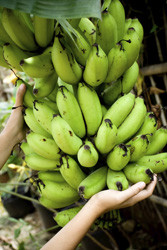Products from banana plant waste
Nearly one fifth of European banana crops come from Europe's southernmost tip — the Canary Islands. In the past, the plant waste was a valuable side-stream. It was used to support tomato plants, to make handicrafts such as baskets and as fodder for cattle and goats. However, factory farming changed the landscape and, once the fruit is harvested, the tree's leftover organic material is simply dumped in ravines. To address this, the BADANA(opens in new window) project reversed the tables. EU funding was provided to 12 partners representing the entire supply chain consisting of research and technology developers, small and medium-sized enterprises (SMEs) and end users. The focus was on the badana, the fibre found in the pseudo-stem layers of the banana tree. The challenge was to find a way to separate the badana from the other parts of the tree to extract high-quality fibres suitable for polymer processing such as injection and rotational moulding. To this end, an automated reverse movement decorticating machine was designed and optimised for both the quality and quantity of the extracted fibre. Subsequently, the fibres were combined with common industrial polymers to produce eco-composites. Scientists then used the new composites to manufacture three products defined by the end users: supports for automobile windows (B-pillars), a kayak and the worktop of a washing machine. Testing demonstrated the excellent suitability for injection moulding of polypropylene compounded with banana fibres to produce green composites. Given the virtually ubiquitous use of injection moulding to form plastic composites, BADANA technology presents an important opportunity for partner SMEs. The eco-friendly materials will be attractive alternatives to many existing products and are expected to open up new markets as well. A comprehensive analysis quantified the multiple environmental benefits that arise from the new process. Banana fibre extraction and use represents a truly sustainable process for production of eco-friendly components in the automotive, packaging and consumer goods industries.







